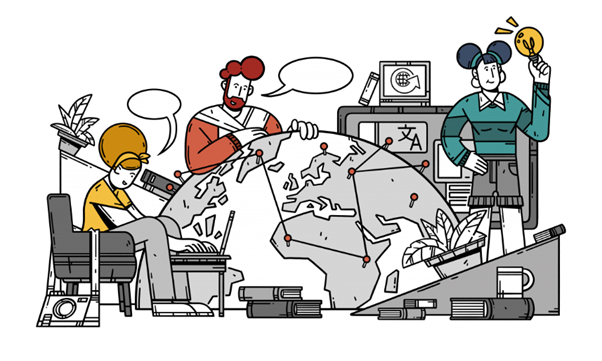From Crowdsourcing to Community: The Evolution of Translation inside the Digital Age
In the digital age, translation services have gone through a full-size transformation, transferring past traditional models ruled via professional translation agency to embrace network-pushed tactics. While structures like Google Translate have made translation greater on hand, they frequently lack the nuanced expertise and cultural sensitivity required for correct and contextually appropriate translations. Community-primarily based translation platforms leverage the collective understanding and linguistic range of users to produce fantastic translations that reflect the richness and complexity of human language.
These systems constitute a shift from crowdsourcing, wherein duties are outsourced to a massive and often nameless organization of people, to network-driven fashions characterized by collaboration, mutual aid, and shared desires. By fostering a feel of belonging and possession amongst customers, network-primarily based translation systems empower individuals to contribute their linguistic talents and cultural understanding to the translation procedure, resulting in translations that are extra accurate, relevant, and inclusive.
Empowering Linguistic Diversity: How Community Translators Are Redefining Language Services
One of the important thing strengths of community-based translation platforms is their capacity to harness linguistic variety as a valuable useful resource for translation. Unlike conventional expert translation organizations, which may additionally have limited language talents and cultural know-how, network translators come from a extensive range of backgrounds and language proficiencies. This variety enables them to address a broader range of translation tasks and deal with the precise linguistic and cultural wishes of different communities.
Community translators regularly have firsthand information of the languages and cultures they paintings with, giving them insights and views that expert translators may lack. This permits them to supply translations that are not handiest linguistically accurate however also culturally sensitive and contextually suitable. By empowering people to translate content of their native language or languages of proficiency, network-based translation systems democratize access to translation services and promote linguistic inclusivity on a worldwide scale.
Translating Together: Harnessing Collective Wisdom in Community-Based Translation
At the heart of community-based totally translation structures is the principle of collaboration, with customers working together to provide translations that meet the very best requirements of fine and accuracy. Unlike traditional translation models, which rely upon character understanding and oversight, network-primarily based systems leverage the collective expertise and peer overview to make sure the reliability and consistency of translations. This collaborative technique now not best improves the general excellent of translations however also fosters a feel of ownership and duty amongst customers.
Community-based translation systems often include functions along with crowdsourced editing, wherein a couple of customers overview and revise translations to ensure accuracy and readability. This collaborative editing system permits for actual-time remarks and discussion, permitting users to examine from every different insights and views. By harnessing the collective expertise of the network, those platforms are capable of produce translations that aren’t only linguistically accurate but additionally culturally relevant and engaging.
Breaking Barriers, Building Bridges: The Social Impact of Community Translation Initiatives
Beyond their position in facilitating conversation across linguistic divides, community-primarily based translation systems have a broader social effect, fostering connections and expertise among people and groups round the world. By presenting a platform for customers to percentage their language skills and cultural know-how, these projects promote move-cultural talk, mutual appreciate, and appreciation for linguistic range.
Community translation tasks also have the ability to empower marginalized or underrepresented communities by using giving them a voice in the global conversation. By allowing people to translate content material in their native language or languages of talent, those systems make bigger numerous views and make certain that a much wider variety of voices is heard. This can cause greater popularity and appreciation of minority languages and cultures, in addition to extended representation and visibility for marginalized communities.
Beyond Algorithms: The Human Touch in Community-Driven Translation Platforms
While system translation algorithms have made big strides in latest years, they nonetheless battle to seize the nuances of human language and subculture. Community-pushed translation platforms offer a human contact that algorithms alone cannot reflect, imparting users with the possibility to interact immediately with different audio system of their language and collaborate on translations in actual-time.
Unlike device translation, which is based on statistical patterns and algorithms, community-driven translation platforms prioritize human know-how and interpretation. Users have the flexibility to select the most suitable translation for a given context, drawing on their very own linguistic understanding and cultural insights. This human-centered method guarantees that translations aren’t most effective correct and dependable but additionally reflect the specific voices and perspectives of the network.
Language for All: Community-Based Translation Platforms and the Democratization of Knowledge
One of the most great contributions of community-primarily based translation systems is their role in democratizing get right of entry to to know-how and statistics. By permitting customers to translate content into more than one languages, those platforms make data more reachable to folks who might not communicate the dominant languages of the net or have confined get right of entry to to conventional translation offerings.
In many elements of the sector, get right of entry to to professional translation services is limited or prohibitively pricey, leaving tens of millions of humans without access to important information and assets. Community-primarily based translation systems help to fill this hole via empowering users to translate content on a volunteer foundation, making sure that vital information is to be had in a couple of languages. This democratization of translation offerings promotes more fairness and inclusivity in the digital age, permitting people from various linguistic backgrounds to take part fully inside the worldwide communication.
Inclusivity in Action: The Role of Community Translation in Bridging Linguistic Gaps
In a global where language barriers often act as obstacles to communique and collaboration, network-based totally translation systems play a essential function in bridging linguistic gaps and fostering inclusivity. By presenting a platform for users to translate content material into multiple languages, these initiatives allow individuals from extraordinary linguistic backgrounds to communicate correctly and get entry to records of their native language.
Community translation initiatives additionally have the ability to promote more know-how and empathy among audio system of different languages. By facilitating go-cultural communicate and collaboration, these systems ruin down stereotypes and misconceptions, fostering a feel of shared humanity and interconnectedness. This can cause more social brotherly love and harmony, as people from diverse linguistic backgrounds come together to paintings closer to common desires and cope with shared demanding situations.
Collaborative Translation: Uniting Global Voices for Seamless Communication
In conclusion, community-based totally translation platforms constitute a effective force for high-quality alternate inside the digital age, empowering individuals to translate content in multiple languages and bridging linguistic divides. By harnessing the collective know-how and linguistic range of customers, these platforms sell greater fairness, inclusivity, and knowledge in the worldwide community. As we maintain to navigate the challenges of an an increasing number of interconnected international, community translation initiatives provide a beacon of wish for a future wherein verbal exchange knows no linguistic boundaries.



